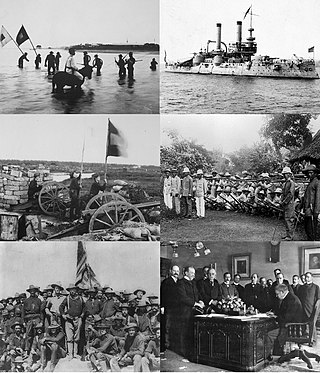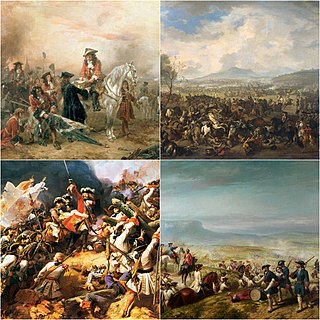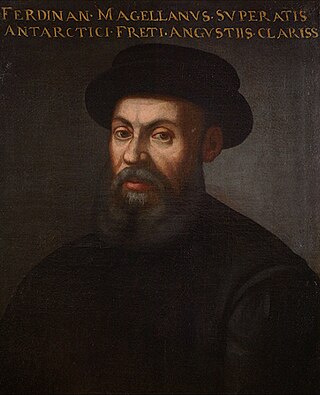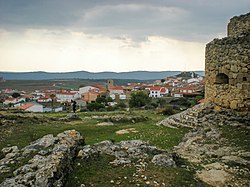
The American Revolutionary War, also known as the Revolutionary War or American War of Independence, was a major war of the American Revolution. Widely considered as the war that secured the independence of the United States, fighting began on April 19, 1775, followed by the Lee Resolution on July 2, 1776, and the Declaration of Independence on July 4, 1776. The American Patriots were supported by the Kingdom of France and, to a lesser extent, the Dutch Republic and the Spanish Empire, in a conflict taking place in North America, the Caribbean, and the Atlantic Ocean.

The British Empire was composed of the dominions, colonies, protectorates, mandates, and other territories ruled or administered by the United Kingdom and its predecessor states. It began with the overseas possessions and trading posts established by England between the late 16th and early 18th centuries. At its height it was the largest empire in history and, for over a century, was the foremost global power. By 1913, the British Empire held sway over 412 million people, 23 per cent of the world population at the time, and by 1920, it covered 35.5 million km2 (13.7 million sq mi), 24 per cent of the Earth's total land area. As a result, its constitutional, legal, linguistic, and cultural legacy is widespread. At the peak of its power, it was described as "the empire on which the sun never sets", as the Sun was always shining on at least one of its territories.

Christopher Columbus was an Italian explorer and navigator who completed four voyages across the Atlantic Ocean sponsored by the Catholic Monarchs of Spain, opening the way for the widespread European exploration and colonization of the Americas. His expeditions were the first known European contact with the Caribbean, Central America, and South America.

Elizabeth I was Queen of England and Ireland from 17 November 1558 until her death in 1603. Elizabeth was the last of the five House of Tudor monarchs and is sometimes referred to as the "Virgin Queen".

Francisco Franco Bahamonde was a Spanish general who led the Nationalist forces in overthrowing the Second Spanish Republic during the Spanish Civil War and thereafter ruled over Spain from 1939 to 1975 as a dictator, assuming the title Caudillo. This period in Spanish history, from the Nationalist victory to Franco's death, is commonly known as Francoist Spain or as the Francoist dictatorship.

The Philippines, officially the Republic of the Philippines, is an archipelagic country in Southeast Asia. It is situated in the western Pacific Ocean and consists of around 7,641 islands that are broadly categorized under three main geographical divisions from north to south: Luzon, Visayas, and Mindanao. The Philippines is bounded by the South China Sea to the west, the Philippine Sea to the east, and the Celebes Sea to the southwest. It shares maritime borders with Taiwan to the north, Japan to the northeast, Palau to the east and southeast, Indonesia to the south, Malaysia to the southwest, Vietnam to the west, and China to the northwest. The Philippines covers an area of 300,000 km2 (120,000 sq mi) and, as of 2021, it had a population of around 109 million people, making it the world's thirteenth-most populous country. The Philippines has diverse ethnicities and cultures throughout its islands. Manila is the country's capital, while the largest city is Quezon City; both lie within the urban area of Metro Manila.

The Spanish–American War was a period of armed conflict between Spain and the United States. Hostilities began in the aftermath of the internal explosion of USS Maine in Havana Harbor in Cuba, leading to United States intervention in the Cuban War of Independence. The war led to the United States emerging predominant in the Caribbean region, and resulted in U.S. acquisition of Spain's Pacific possessions. It led to United States involvement in the Philippine Revolution and later to the Philippine–American War.

The Thirty Years' War was one of the longest and most destructive conflicts in European history, lasting from 1618 to 1648. Fought primarily in Central Europe, an estimated 4.5 to 8 million soldiers and civilians died as a result of battle, famine, and disease, while some areas of what is now modern Germany experienced population declines of over 50%. Related conflicts include the Eighty Years' War, the War of the Mantuan Succession, the Franco-Spanish War, and the Portuguese Restoration War.

The War of the Spanish Succession was a European great power conflict that took place from 1701 to 1714. The death of childless Charles II of Spain in November 1700 led to a struggle for control of the Spanish Empire between his heirs, Philip of Anjou and Charles of Austria, and their respective supporters, among them Spain, Austria, France, the Dutch Republic, Savoy and Great Britain. Related conflicts include the 1700–1721 Great Northern War, Rákóczi's War of Independence in Hungary, the Camisards revolt in southern France, Queen Anne's War in North America and minor trade wars in India and South America.

Jaén is the urban capital city of the province of Jaén, in the autonomous community of Andalusia, Spain.

Charles V was Holy Roman Emperor and Archduke of Austria from 1519 to 1556, King of Spain from 1516 to 1556, and Lord of the Netherlands as titular Duke of Burgundy from 1506 to 1555. As he was head of the rising House of Habsburg during the first half of the 16th century, his dominions in Europe included the Holy Roman Empire, extending from Germany to northern Italy with direct rule over the Austrian hereditary lands and the Burgundian Low Countries, and the Spain with its southern Italian possessions of Naples, Sicily, and Sardinia. He oversaw both the continuation of the long-lasting Spanish colonization of the Americas and the short-lived German colonization of the Americas. The personal union of the European and American territories of Charles V was the first collection of realms labelled "the empire on which the sun never sets".

Charles II of Spain, known as the Bewitched, was the last Habsburg ruler of the Spanish Empire. Best remembered for his physical disabilities and the War of the Spanish Succession that followed his death, Charles's reign has traditionally been viewed as one of managed decline. However, many of the issues Spain faced in this period were inherited from his predecessors and some recent historians have suggested a more balanced perspective.

The Spanish Empire, also known as the Hispanic Monarchy or the Catholic Monarchy was a colonial empire governed by Spain and its predecessor states between 1492 and 1976. One of the largest empires in history, it was, in conjunction with the Portuguese Empire, the first to usher the European Age of Discovery and achieve a global scale, controlling vast portions of the Americas, territories in Western Europe, Africa, and various islands in Asia and Oceania. It was one of the most powerful empires of the early modern period, becoming the first empire known as "the empire on which the sun never sets", and reached its maximum extent in the 18th century.

Dora the Explorer is an American children's animated television series and multimedia franchise created by Chris Gifford, Valerie Walsh Valdes and Eric Weiner that premiered on Nickelodeon on August 14, 2000, and ended on August 9, 2019. The series was produced by Nickelodeon Animation Studio. The show focuses on the adventures of a Latin American girl named Dora and her monkey friend Boots, with a particular emphasis on the Spanish language. The show is presented in the style of both an interactive CD-ROM game and a point-and-click adventure game, with gimmicks such as title cards appearing in windows and Dora asking the viewer to help her by showing the current items in her inventory and asking the viewer which one is best for the current scenario.

Cuba, officially the Republic of Cuba, is an island country comprising the island of Cuba, as well as Isla de la Juventud and several minor archipelagos. Cuba is located where the northern Caribbean Sea, Gulf of Mexico, and Atlantic Ocean meet. Cuba is located east of the Yucatán Peninsula (Mexico), south of both the American state of Florida and the Bahamas, west of Hispaniola, and north of both Jamaica and the Cayman Islands. Havana is the largest city and capital; other major cities include Santiago de Cuba and Camagüey. The official area of the Republic of Cuba is 109,884 km2 (42,426 sq mi) but a total of 350,730 km² including the exclusive economic zone. Cuba is the second-most populous country in the Caribbean after Haiti, with over 11 million inhabitants.

The Spanish Republic, commonly known as the Second Spanish Republic, was the form of government in Spain from 1931 to 1939. The Republic was proclaimed on 14 April 1931, after the deposition of King Alfonso XIII, and was dissolved on 1 April 1939 after surrendering in the Spanish Civil War to the Nationalists led by General Francisco Franco.

The Spanish Civil War was a civil war in Spain fought from 1936 to 1939 between the Republicans and the Nationalists. Republicans were loyal to the left-leaning Popular Front government of the Second Spanish Republic, and consisted of various socialist, communist, separatist, anarchist, and republican parties, some of which had opposed the government in the pre-war period. The opposing Nationalists were an alliance of Falangists, monarchists, conservatives, and traditionalists led by a military junta among whom General Francisco Franco quickly achieved a preponderant role. Due to the international political climate at the time, the war had many facets and was variously viewed as class struggle, a religious struggle, a struggle between dictatorship and republican democracy, between revolution and counterrevolution, and between fascism and communism. According to Claude Bowers, U.S. ambassador to Spain during the war, it was the "dress rehearsal" for World War II. The Nationalists won the war, which ended in early 1939, and ruled Spain until Franco's death in November 1975.

Argentina, officially the Argentine Republic, is a country in the southern half of South America. Argentina covers an area of 2,780,400 km2 (1,073,500 sq mi), making it the second-largest country in South America after Brazil, the fourth-largest country in the Americas, and the eighth-largest country in the world. It shares the bulk of the Southern Cone with Chile to the west, and is also bordered by Bolivia and Paraguay to the north, Brazil to the northeast, Uruguay and the South Atlantic Ocean to the east, and the Drake Passage to the south. Argentina is a federal state subdivided into twenty-three provinces, and one autonomous city, which is the federal capital and largest city of the nation, Buenos Aires. The provinces and the capital have their own constitutions, but exist under a federal system. Argentina claims sovereignty over the Falkland Islands, South Georgia and the South Sandwich Islands, and a part of Antarctica.

Ferdinand Magellan was a Portuguese explorer. He is best known for having planned and led the 1519 Spanish expedition to the East Indies across the Pacific Ocean to open a maritime trade route, during which he discovered the interoceanic passage bearing thereafter his name and achieved the first European navigation from the Atlantic to Asia.

The history of the Philippines from 1565 to 1898 is known as the Spanish colonial period, during which the Philippine Islands were ruled as the Captaincy General of the Philippines within the Spanish East Indies, initially under the Kingdom of the Viceroyalty of New Spain, based in Mexico City, until the independence of the Mexican empire from Spain in 1821. This resulted in direct Spanish control during a period of governmental instability there. However, unlike the Spanish American colonies, the Philippines, being less significant to the Spanish economy, were under much less direct royal control.






















